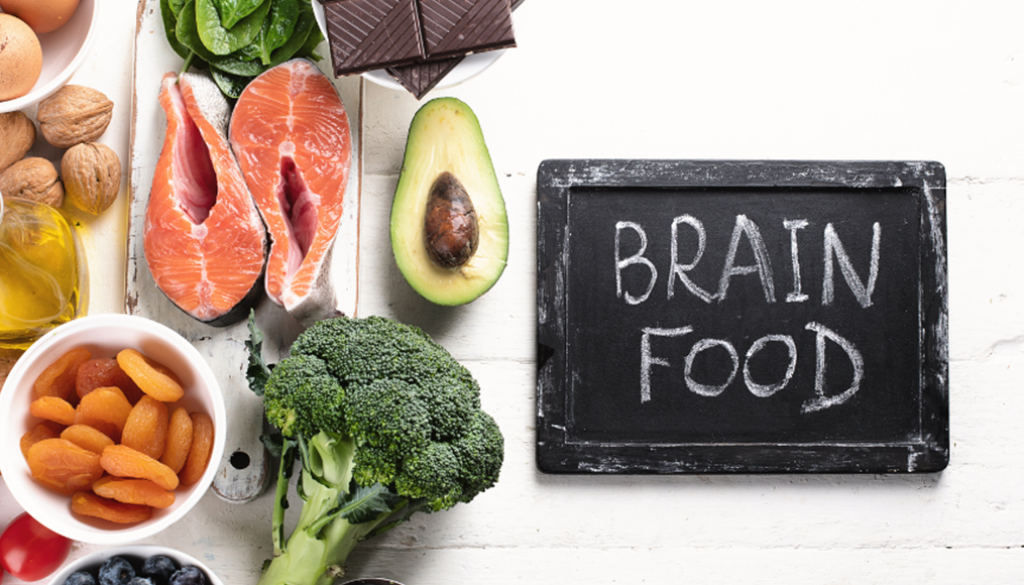Healthy Brain Food for Women
“It’s been said that ‘you are what you eat.’ Although this may not be entirely true, the foods you eat can indeed affect your brain health, subsequently influencing your memory and behaviour. That’s why consuming healthy brain food is crucial.
According to a 2018 study, two-thirds of dementia patients are women. Additionally, women make up 60 percent of caregivers, providing care for a friend or loved one with the disease. Women in their 60s are also more than twice as likely to develop dementia compared to breast cancer. Furthermore, because the early signs and symptoms of dementia can often be mistaken for menopause, it’s essential to pay attention to intuition when something doesn’t seem right. Early intervention can play a vital role in dementia prevention and management.”

How Food can Impact Brain Health
Absolutely, food can indeed play a significant role in brain health and potentially aid in dementia prevention. Here are some of the best brain foods that have been suggested for dementia prevention:
1. Fatty Fish: Rich in omega-3 fatty acids, fatty fish like salmon, trout, and sardines can support brain health and may reduce the risk of dementia.
2. Blueberries: Packed with antioxidants, blueberries have been linked to improved brain function and memory.
3. Nuts and Seeds: Nuts and seeds are excellent sources of healthy fats, antioxidants, and vitamins that can benefit brain health. Almonds, walnuts, flaxseeds, and chia seeds are particularly beneficial.
4. Leafy Green Vegetables: Vegetables like spinach, kale, and broccoli are high in antioxidants and vitamins that support brain health and may reduce the risk of cognitive decline.
5. Berries: In addition to blueberries, other berries like strawberries, blackberries, and raspberries are rich in antioxidants and have been associated with improved brain function.
6. Whole Grains: Whole grains like oats, quinoa, and brown rice provide a steady source of energy for the brain and contain nutrients that support brain health.
7. Avocados: Avocados are rich in healthy fats, vitamins, and minerals that support brain function and may reduce the risk of cognitive decline.
8. Dark Chocolate: Dark chocolate contains flavonoids, caffeine, and antioxidants that may improve memory, focus, and overall brain health when consumed in moderation.
Incorporating these brain-boosting foods into your diet along with a balanced and healthy eating plan may help support brain health and reduce the risk of dementia.
Healthy gut foods
Cutting-edge research on food and Alzheimer’s prevention has focused on the microbiome, which refers to the colony of trillions of microorganisms—such as bacteria, fungi, viruses, and parasites—that reside in your gut.
Recent studies suggest that the specific microorganisms in your gut may impact your risk for cognitive problems. To aid in dementia prevention, it’s recommended to consume foods that promote the growth of beneficial microorganisms in your gut.
Prebiotic foods help create an optimal environment in your gut for beneficial microorganisms to thrive. These foods, best consumed in their raw form, include garlic, leeks, asparagus, onions, bananas, artichokes, and seaweed.
Probiotics, on the other hand, supply the beneficial microorganisms themselves. Foods rich in probiotics include yoghourt with live cultures, kefir, sauerkraut, pickled vegetables, kimchi, and kombucha tea.
Incorporating prebiotic and probiotic-rich foods into your diet can help foster a healthy microbiome, potentially reducing the risk of cognitive decline and supporting brain health.
Green tea
Green tea indeed contains several ingredients that contribute to its potential benefits for brain health. Here’s how:
1. Caffeine: Green tea contains caffeine, a natural stimulant that can improve memory, focus, and overall cognitive function.
2. L-theanine: This amino acid found in green tea has been shown to increase the production of gamma-aminobutyric acid (GABA), a neurotransmitter that helps lower anxiety and promote relaxation without causing drowsiness.
3. Polyphenols and Antioxidants: Green tea is rich in polyphenols and antioxidants, such as catechins and epigallocatechin gallate (EGCG). These compounds have anti-inflammatory and neuroprotective properties, which may help in dementia prevention and reduce the risk of Parkinson’s Disease by protecting brain cells from damage caused by oxidative stress.
Incorporating green tea into your daily routine may offer various benefits for brain health, including improved cognitive function, reduced anxiety, and enhanced protection against neurodegenerative diseases. However, it’s essential to consume green tea in moderation, as excessive caffeine intake can lead to adverse effects.

Water
Ensuring proper hydration is crucial for optimal brain function, as your brain is composed of approximately 85 percent water. Adequate hydration not only supports cognitive performance but also helps maintain energy levels for your workout routine.
To keep both your body and mind functioning at their best, aim to consume four to eight cups of water per day. This recommended daily intake helps replenish lost fluids and supports various bodily functions, including brain health and physical performance.







